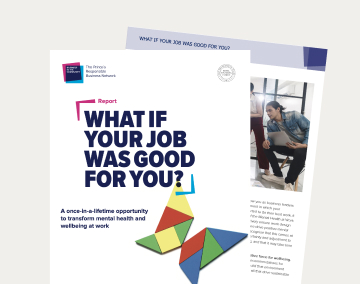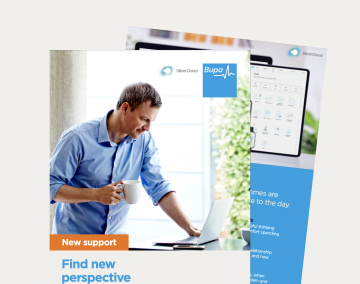High functioning anxiety
When high performance masks anxiety
Outward success can sometimes mask inner turmoil. High performing, or functioning, anxiety, is a mental health challenge which has been recognised only relatively recently — but it can lead to significant levels of distress.
The hallmark of this often severe mental health challenge is that people who are affected continue to function effectively, and are able to mask their symptoms from colleagues and family. And because they have developed extensive coping mechanisms, their productivity and work performance often places them among the top performers in an organisation.
There is evidence of some advantages to anxiety. Researchers at the French Institute of Health and Medical Research found that anxious people process threats more quickly and differently, using regions of the brain responsible for action — which could, theoretically, give them an edge in business.1
Impact
But this constant alertness and anxiety comes at a cost. Dr Naomi Humber, a Clinical Psychologist and Head of Mental Wellbeing at Bupa Health Clinics, says, “The impact on their overall mental health and wellbeing can be severe.
And this is supported by the latest Bupa Global Executive Wellbeing Index, which found 14% of business leaders are experiencing mental exhaustion and burnout and 17% are finding it difficult to make decisions.2
Overall, two-thirds (67%) of senior executives have experienced at least one symptom of mental ill-health in the past year and, worryingly, thoughts of self-harm — which did not register as an issue a year ago — are now troubling one in 14.3
"They are at increased risk of turning to unhealthy coping strategies such as alcohol, drugs and other addictive behaviours like gambling. They are also at significantly higher risk of burnout."
But Dr Humber says that when high functioning anxiety is a factor, family and co-workers often don’t realise there is a problem until the burden becomes unbearable and it is exposed by burnout or some other traumatic event.

Dr Naomi Humber
Clinical Psychologist and Head of Mental Wellbeing
Bupa Health Clinics
Unprecedented stress
As the Bupa Global Executive Wellbeing Index shows, the pandemic has been a tipping point for many executives and Dr Humber says, “There is no doubt that the fallout from the pandemic has been disproportionately felt, with some managers coping with immeasurable and unprecedented amounts of stress and pressure.
“They have been forced to make decisions at pace, on a day-to-day basis, while working around the clock. And many senior managers have also had to make major personnel and structural changes which are, in and of themselves, hugely stressful.”
Supporting the mental health and wellbeing of their teams has been a priority, but Dr Humber says many executives are failing to protect their own mental health — and this is undermining their ability to maintain prolonged peak performance.
Strengths can be vulnerabilities
As the Bupa Global Executive Wellbeing Index confirmed, many executives are attuned to these personal mental health challenges and take positive steps to manage their psychological wellbeing. More than a third (36%) have sought professional help, 44% have explored relaxation techniques and a third (33%) have practised mindfulness and meditation.4
But, to some extent, it is the qualities which make them strong leaders which also make senior executives vulnerable to mental health issues. Dr Humber explains, “They are often perfectionists, who set high standards for themselves, and when they notice a few red flags going up in relation to their mental health they see that as part and parcel of the job.
“If they feel any sense of anxiety or symptoms of mental ill-health, they often put their foot on the gas and push themselves even harder. Work becomes an unhealthy coping strategy.”

Breaking Point
Disrupting this pattern of using work as a coping mechanism can prevent problems escalating, but she says the stigma which still surrounds mental health is particularly challenging for workers in more senior roles.
“There is a very romantic view of leadership. Highly successful people are assumed to be immune to mental health problems, and feel they will be criticised when they are not as ‘superhuman’ as is expected of them.”
Importance of trust
There are also very few people around senior executives who have experience of the pressures they face and knowledge of specific business challenges. “Trust is also a factor. Who can they trust with this very sensitive and personal information?”
Dr Humber suggests developing discrete packages of resilience monitoring and input from different professionals who are trusted, and able to recognise any individualised warning signs, triggers, risk and need.
Resources
Important components of this could be mental wellness resources such as Healthy Minds — a 24/7 confidential telephone support line providing access to a counsellor who is trained to listen and provide on a range of issues that can go beyond work. There are also anonymised services such as Silvercloud — evidence-based online support which can easily fit into frenetic work schedules.
She believes business can also learn from competitive sport. As Liz Nicholl, the former CEO of UK Sport and President of World Netball, says, “High performance cultures have a reputation for being ruthless in their drive for top results, but getting the culture right is key to getting the best performance from people.”5
Dr Humber agrees, “It's not only about mental health, it's about resilient performance by keeping agile and fresh.”
Supporting You
Practical tips, advice, and support on dealing with stress
Take a look at the What If Your Job Was Good for You? report by Business in the Community
Find new perspective with SilverCloud
1 https://www.sciencedaily.com/releases/2015/12/151229070643.htm
2 Bupa Global Executive Wellbeing Index, UK data
3 Bupa Global Executive Wellbeing Index, UK data
4 Bupa Global Executive Wellbeing Index, UK data
5 Bupa Wellbeing Edit 2017
Bupa health insurance is provided by Bupa Insurance Limited. Registered in England and Wales No. 3956433. Bupa Insurance Limited is authorised by the Prudential Regulation Authority and regulated by the Financial Conduct Authority and the Prudential Regulation Authority. Arranged and administered by Bupa Insurance Services Limited, which is authorised and regulated by the Financial Conduct Authority. Registered in England and Wales No. 3829851. Registered office: 1 Angel Court, London EC2R 7HJ
Bupa Health Trusts are administered by Bupa Insurance Services Limited. Registered in England and Wales No. 3829851. Registered office: 1 Angel Court, London EC2R 7HJ © Bupa 2025





